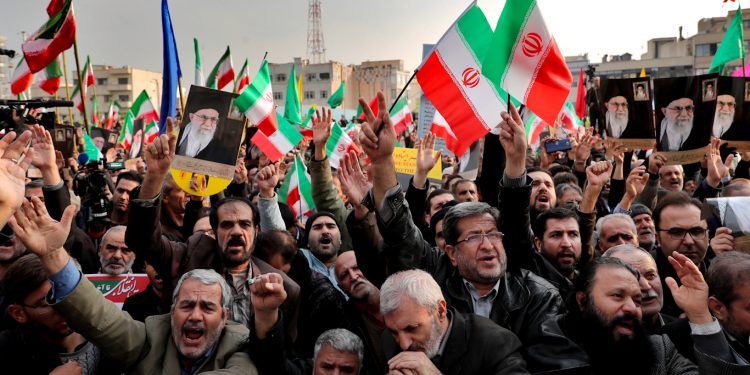Washington: The United States said Thursday the Iranian regime could have murdered over 1,000 of its citizens in a crackdown against a popular protest against it that began last month.
“As the truth is trickling out of Iran, it appears the regime could have murdered over 1,000 Iranian citizens since the protests began,” State Department Special Representative for Iran Brian Hook told reporters during a news conference here.
Protests broke out in Iran November 15 after the government hiked fuel prices.
The United States has received more than 32,000 videos of protestors through a secure site and they reveal the brutality of the regime, Hook said, adding that the State Department was looking at each one of them.
Referring to some of the videos, Hook said that in Mahshahr, a city in southwest Iran, a number of Iranian demonstrators blocked a road when the Islamic Revolutionary Guard Corps or IRGC opened fire without warning, killing several people.
“Many of the protesters fled to nearby marshlands to escape. The IRGC tracked them down and surrounded them with machine guns mounted on trucks. They then sprayed the protesters with bullets. Between the rounds of machine-gun fire, the screams of the victims can be heard,” he said.
In this one incident alone, the regime murdered as many as 100 Iranians and possibly more, he said.
“We cannot be certain because the regime blocks information. Among those murdered are at least a dozen children, including 13 and 14-year-olds,” Hook said.
When it was over, the regime loaded the bodies into trucks, he said.
“We do not yet know where these bodies were taken, but we are learning more and more about how the Iranian regime treats its own people,” he said.
Hook said the US had received reports from family members of the victims who tried to recover the bodies that the authorities allegedly demanded that the families first pay the cost of the bullets they used.
In many cases, the authorities would not hand over the bodies until their family promised not to hold public funerals, he alleged.
Thousands of Iranians have been wounded, and at least 7,000 protesters detained, many of whom have been sent to two prisons, the Great Tehran Penitentiary and Gharchak Prison, he said.
Thursday, US Secretary of State Mike Pompeo determined these entities meet the criteria for gross human rights violations set out in CAATSA, and the State Department is submitting to Congress the names of these entities, he told reporters.
The Great Tehran Penitentiary is known for its inhumane living conditions – unsanitary and crowded quarters, rodent infestations, insufficient food, water, and medical care – he said.
“We have seen reports that protesters have been subject to abuse and mistreatment during interrogations, arbitrary beatings, and rape,” he alleged.
Gharchak Prison is Iran’s largest women’s prison, and also holds many members of religious minority communities, Hook said.
It, too, is known for unbearable conditions, including regular assaults and inappropriate behaviour of prison guards towards women, chronic lack of water, unsanitary living spaces, and an environment that enables rape and murder, he said.
“The United States calls for the immediate release of all protesters detained in prison, as well as all the political prisoners currently held by the regime. Now is the time for all nations to stand with the Iranian people, diplomatically isolate the regime, and sanction those officials who are responsible for murdering innocent Iranians,” Hook said.
“There has been an overwhelming support for the Iranian people by the American people. It is clear there is a bipartisan consensus that the regime’s treatment of the Iranian people is abhorrent and unacceptable. We are unified here in the United States, and the international community likewise should be unified and support the Iranian people,” he said.
PTI







































